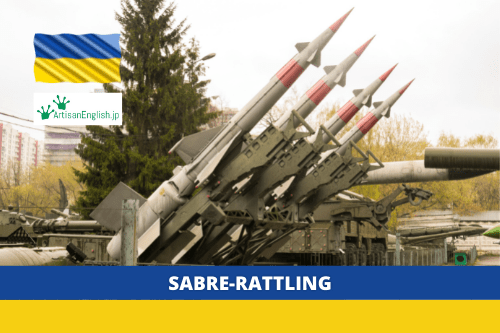
YouTube / iTunes / Spotify / Radio Public / Pocket Casts / Google Podcasts / Breaker / Overcast
Listen to ArtisanEnglish.jp posts & lesson intros here.
WotD: Sabre-rattling
In hindsight, we can now say what we thought was merely sabre-rattling was open preparation for war.
The West had grown too comfortable with threats of war from Russia, North Korea and perhaps China.
As Russia built up its forces on the borders of Ukraine, even conducting joint ‘exercises’ in Belarus, the world preferred to believe it was nothing but sabre-rattling and the troops would be ordered to return to barracks after a few weeks.
Sabre-rattling is opening and loudly threatening to use force to intimidate your enemies.
Only the Americans warned an invasion was imminent, and everyone figured they were crying wolf.
Well, now we know that wasn’t the case.
The sabre has been removed from its scabbard and is now stained with the blood of the innocent.
Sabre-rattling is opening and loudly threatening to use force to intimidate your enemies.
How many times has Russia mentioned that it has nuclear weapons?
So often that we no longer take it seriously.
How often has North Korea threatened to rain down hellfire on its enemies?
So often, we see it as mere sabre-rattling and no longer take it seriously.
The last time North Korea sent a missile over Japan, companies phoned their employees and told them to come into work even though the government was warning people to ‘shelter in a strong building.’
Perhaps the only good thing to come out of the suffering of the Ukrainian people is that we will no longer see sabre-rattling as harmless.
Maybe we should let it be known that they can sabre-rattle all they want.
However, if they start something, we will end it.
I don’t particularly appreciate being intimidated.
Do you?
Flesch-Kincaid Readability Test
This post is understandable by someone with at least an 8th-grade education (age 13 – 14).
On the Flesch-Kincaid reading-ease test, this post scores 66.
The easier a passage is to read, the higher the score on a scale of 0 – 100.

